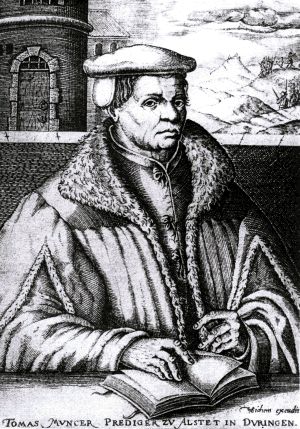“The people will be free and God alone will be their Lord.”
Letter to the Princes as cited in The German Peasants' War and Anabaptist Community of Goods, p. 109 https://books.google.com/books?id=MeFSqubf6VAC&pg=PA107
Thomas Müntzer was a German preacher and radical theologian of the early Reformation whose opposition to both Martin Luther and the Roman Catholic Church led to his open defiance of late-feudal authority in central Germany. Müntzer was foremost amongst those reformers who took issue with Luther's compromises with feudal authority. He became a leader of the German peasant and plebeian uprising of 1525 commonly known as the German Peasants' War. He was captured after the Battle of Frankenhausen, and was tortured and executed.
Few other figures of the German Reformation raised as much controversy as Müntzer, which continues to this day. A complex and unique figure in history, he is now regarded as a significant player in the early years of the German Reformation and also in the history of European revolutionaries. Almost all modern studies of Müntzer stress the necessity of understanding his revolutionary actions as a consequence of his theology: Müntzer believed that the end of the world was imminent and that it was the task of the true believers to aid God in ushering in a new era of history. Within the history of the Reformation, his contribution, especially in liturgy and biblical exegesis, was of substance, but remains undervalued.
Wikipedia

“The people will be free and God alone will be their Lord.”
Letter to the Princes as cited in The German Peasants' War and Anabaptist Community of Goods, p. 109 https://books.google.com/books?id=MeFSqubf6VAC&pg=PA107
Letter to the Princes, as cited in Transforming Faith Communities: A Comparative Study of Radical Christianity, p. 173 http://books.google.com/books?id=6FRJAwAAQBAJ&pg=PA173
(de) Sieh zu, die Grundsuppe des Wuchers, der Dieberei und Räuberei sein unser Herrn und Fürsten, nehmen alle Kreaturen zum Eigentum: die Fisch im Wasser, die Vögel in der Luft, das Gewächs auf Erden muß alles ihr sein (Jes. 5). Darüber lassen sie dann Gottes Gebot ausgehen unter die Armen und sprechen: »Gott hat geboten: Du sollst nicht stehlen.
in Revelation and Revolution: Basic Writings of Thomas Müntzer (1993), p. 200 http://books.google.com/books?id=xAKM85a4EekC&pg=PA200
"A Protest about the Condition of the Bohemians," p. 5
Wu Ming Presents Thomas Müntzer, Sermon to the Princes
"A Protest about the Condition of the Bohemians"
Wu Ming Presents Thomas Müntzer, Sermon to the Princes
"A Protest about the Condition of the Bohemians"
Wu Ming Presents Thomas Müntzer, Sermon to the Princes
"Special Exposure of False Faith" (1524)
Wu Ming Presents Thomas Müntzer, Sermon to the Princes
“The fear of God at the beginning of faith is an unbearable thing to human nature.”
"Exposure of False Faith" (1524), in Revelation and Revolution: Basic Writings of Thomas Müntzer (1993), p. 117
Exposure of False Faith (1524)
Original: (de) Es ist der Natur ein unleidlichs Werk, die Furcht Gottes zum Anfang des Glaubens zu machen.